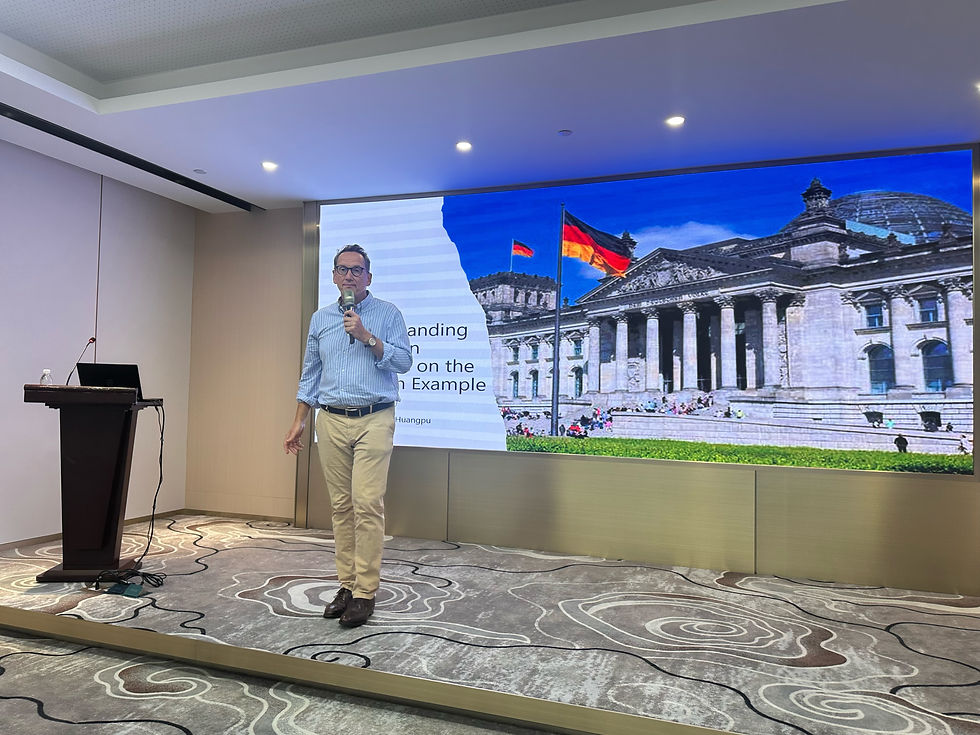Peter Helis Empowers Chinese Entrepreneurs with Insights on European Business at Guangzhou Huangpu Training Session
- helis66
- Oct 17, 2025
- 2 min read

Chief Advisor Highlights German Business Success and Cross-Cultural Strategies for CollaborationGuangzhou, October 19, 2025 — Peter Helis, Chief Advisor to Guangzhou Huangpu District and International Executive Representative for Invest Guangzhou, delivered an impactful training session today for Chinese entrepreneurs, focusing on understanding the European business landscape through the lens of Germany’s economic model. Held in Guangzhou Huangpu, a thriving hub of green technology and smart manufacturing, the session equipped participants with critical insights into German business practices and cross-cultural strategies to foster successful Sino-European partnerships.Drawing from his extensive 65-page presentation, Understanding European Business on the German Example, Helis explored Germany’s position as the world’s third-largest economy with a nominal GDP of approximately $4.3 trillion in 2023, accounting for over 25% of the Eurozone’s economic output. He highlighted the historical evolution of the "Made in Germany" label, which transformed from a protectionist marker in 1887 to a global symbol of quality, engineering, and reliability. Helis detailed Germany’s business structure, emphasizing the pivotal roles of multinational corporations (MNCs) like Siemens, Volkswagen, and BASF, alongside the innovative small and medium-sized enterprises (SMEs) and "hidden champions" that dominate niche markets globally.A key focus was Germany’s success in China, particularly in Taicang, Jiangsu, recognized as a Sino-German Enterprise Cooperation Base since 2008. Helis noted Taicang’s growth from hosting its first German company, Kern-Liebers, in 1993, to over 250 German enterprises by 2023, driven by supportive policies, proximity to Shanghai, and a German-style vocational training system. In contrast, he addressed the relatively lower presence of German SMEs in Guangdong, where only 10% of German companies in China are based, presenting an opportunity for Huangpu to attract more investment by leveraging its vibrant Greater Bay Area (GBA) ecosystem, access to a large market, and policy incentives.Helis also underscored the importance of cross-cultural communication for successful collaborations. He contrasted Chinese high-context, indirect communication styles with the direct, data-driven approaches favored in Europe, offering practical tips such as using clear email communication, respecting punctuality, and avoiding sensitive topics like politics or personal finances. “In Huangpu’s global business landscape, cultural competence is as critical as market knowledge,” Helis emphasized, citing statistics that organizations with strong cross-cultural capabilities are 2.6 times more likely to achieve financial targets.The training, attended by local entrepreneurs eager to tap into European markets, sparked engaging discussions on navigating Germany’s current economic challenges—such as high energy costs and a skilled labor shortage—while capitalizing on opportunities like supply chain optimization and innovation-driven partnerships in the GBA. Helis encouraged participants to adopt a long-term orientation, mirroring Germany’s focus on sustainable growth and stakeholder collaboration, to build resilient ventures.


